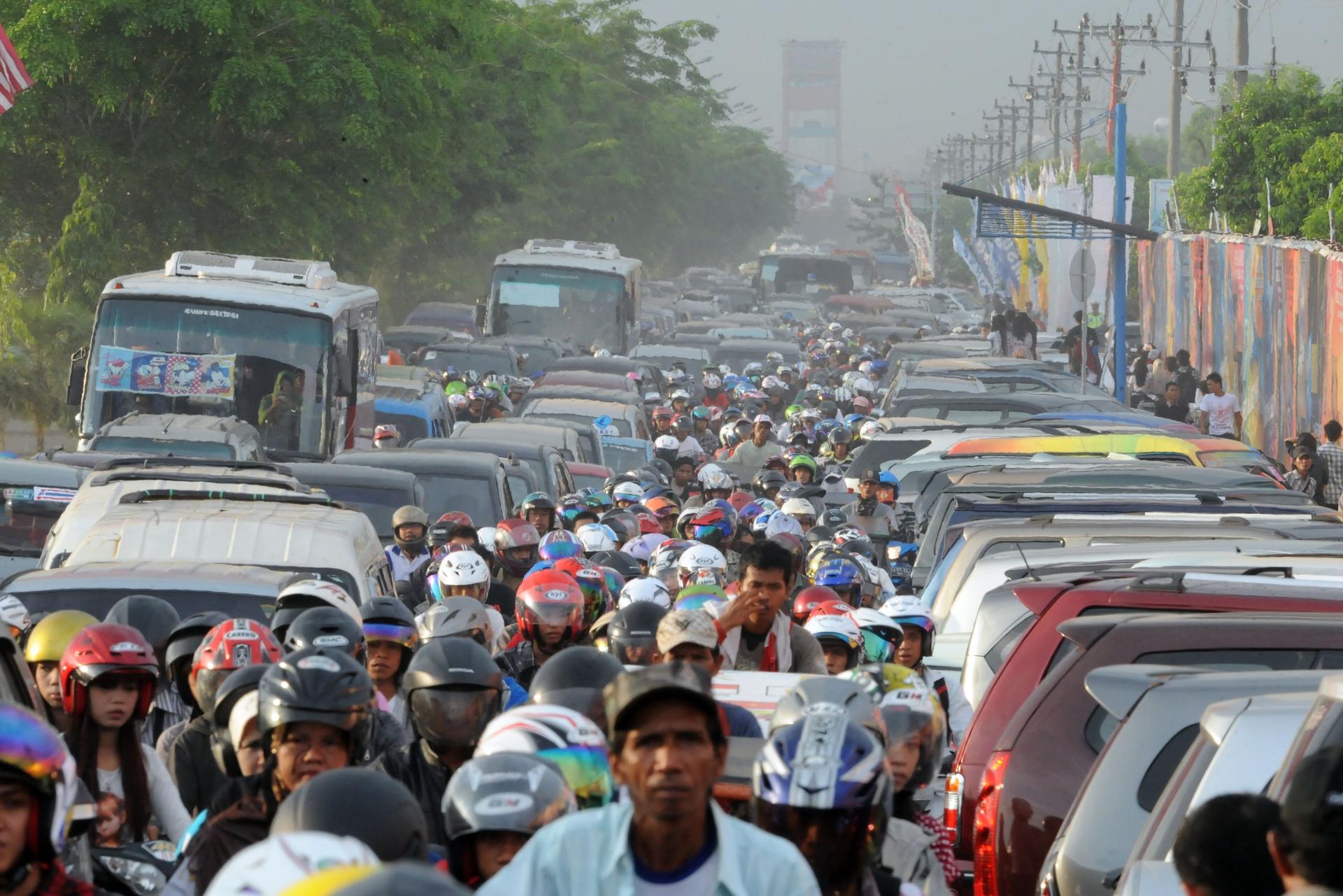Indonesia calls US troop buildup in Darwin “too close for comfort”
Motorists inch their way in a heavy traffic in Sumatra, Indonesia, on November 19, 2011.
Much attention was focused on China's reaction to the announcement that American would send troops on a regular basis to northern Australia.
Needless to say, Beijing isn't mad keen on the idea, and who could blame them, wrote Tom Hayden, a former State Senator, in the Huffington Post:
Could anyone imagine the Chinese government sending carriers and submarines to the California coast and announcing their intention to play a larger long-term role in shaping the western coasts of the Americas?
On Friday, according to The New York Times, Chinese Premier Wen Jiabao warned the US against a military expansion in the region, saying that "outside forces should not, under any pretext" interfere in a regional fight over the control of the South China Sea.
President Barack Obama, also attending the East Asia Summit in Bali, later met with Wen to discuss tensions between the two world powers heightened by the announcement last week that 2,500 US Marines would be deployed to train near Darwin.
Now Indonesia is making its displeasure known, and the only surprise there is that it's taken so long.
At its closest point, Indonesia's shores lie 600 or so miles from Darwin.
While Obama has suggested that his Darwin troop deployment — and a US offer of a new warship for the Philippines — would be used to "project power and deter threats to peace," Indonesia has directly linked it to regional disputes over the oil- and gas-rich South China Sea.
According to the Jakarta Post, Indonesia's military commander Admiral Agus Suhartono on Saturday expressed his fear that the world's most populous Muslim nation could now be drawn into skirmishes like one earlier this year between China and the Philippines.
''Their military fleets would very likely go back and forth through our waters, given the analysis that the planned base will have to conduct [military exercises] due to rising tension in the South China Sea,'' he reportedly said. ''We haven't learnt clearly what this deal is but we have been studying the plan and analyzing any potential impacts on Indonesia … we have begun consulting all sources.''
Meanwhile, a strongly worded editorial in The Jakarta Post described a Darwin base populated by US troops as ''simply too close for comfort.''
''The move is not exactly the kind of signal that they are looking for in terms of greater US engagement with Asia,'' the paper said. The timing of the announcement was bound to stir up controversy.
And Indonesia's foreign minister, Marty Natalegawa, reportedly said the Darwin deal would generate a ''vicious circle of tension and mistrust.''
China has already sent a special message of sort to Australia — warning that it risked being "caught in the cross fire" of any outbreak of regional hostilities.
If that weren't cause enough for concern, how the deal plays out in terms of relations with our nearest neighbor should be.
Australia and Indonesia — despite religious and cultural differences — enjoy strong political, economic and security ties that have weathered such seismic events as the Asian financial crisis, East Timor’s Independence, the Bali bombings and the devastating 2004 tsunami.
Things haven't always been so — for much of its relatively short history, Australia has sought protection from perceived aggressors to its north, particularly Indonesia. Close Australia-US military ties are a product of this irrational fear of the expansionist "Asian hordes."
(GlobalPost reports: Australians divided over more US troops Down Under)
Ahead of a meeting with President Susilo Bambang Yudhoyono at the East Asia summit, Australian Prime Minister Julia Gillard conceded that the relationship has faced some significant tests in recent times, including the ban on cattle exports to Indonesia, the issue of people smuggling via Indonesia to Australia, and the treatment of an Australian 14-year-old buying marijuana in Lombok and still being held by the Indonesian authorities.
Gillard reportedly described the meeting with Yudhoyono — one in a series of bilateral meetings — as "a sign of the growing strategic partnership between our two countries."
"But overall the relationship is a strong one and we are going to keep building on that strength for the future."
Perhaps, but only time — and more US boots on Australian soil — may tell.
